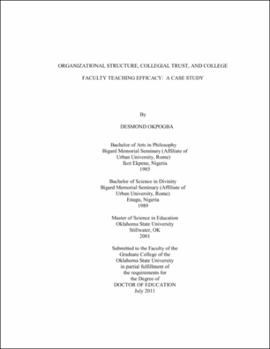| dc.contributor.advisor | Forsyth, Patrick | |
| dc.contributor.author | Okpogba, Desmond | |
| dc.date.accessioned | 2013-11-26T08:34:48Z | |
| dc.date.available | 2013-11-26T08:34:48Z | |
| dc.date.issued | 2011-07 | |
| dc.identifier.uri | https://hdl.handle.net/11244/7529 | |
| dc.description.abstract | Scope and Method of Study: The purpose of this mixed-method study was to explore the relationship between faculty self-efficacy, organizational structure, and collegial trust. The concepts of teacher self-efficacy, organizational structure, and collegial trust were used to investigate any possible empirical relationships existing between these variables in a private, Catholic university in a Midwestern state. | |
| dc.description.abstract | The construct of faculty self-efficacy were measured with a modified version of the 15-item teacher self-efficacy scale of Gibson and Dembo (1984). The organizational structure was measured with Hoy and Sweetland's (2000, 2001) 12-item enabling structure scale adapted for higher education. Collegial trust of faculty was measured by an 8-item collegial trust scale based on Hoy and Tschannen-Moran's (1998) Omnibus T-scale and adapted for higher education respondents in a manner similar to the approach used in the High Educational Faculty Trust Inventory (HEFTI) of Smith and Shoho (2007). After analyzing faculty data on these variables, individuals with high and low scores were identified and interviewed to explore responses of the participants. | |
| dc.description.abstract | Findings and Conclusions: Organizational structure and faculty self-efficacy were moderately correlated (r=.34) and faculty collegial trust and faculty self-efficacy were also moderately correlated (r=.35). However, the qualitative interview analysis seemed to verify the importance of organizational structure and collegial trust for faculty self-efficacy perceptions. These findings support prior research on teacher self-efficacy and collegial trust and organizational structure at the K- 12 levels. These constructs would be useful, as educators try to find means of enhancing academic success among college students. | |
| dc.format | application/pdf | |
| dc.language | en_US | |
| dc.rights | Copyright is held by the author who has granted the Oklahoma State University Library the non-exclusive right to share this material in its institutional repository. Contact Digital Library Services at lib-dls@okstate.edu or 405-744-9161 for the permission policy on the use, reproduction or distribution of this material. | |
| dc.title | Organizational structure, collegial trust, and college faculty teaching efficacy: A case study | |
| dc.contributor.committeeMember | Harris, Ed | |
| dc.contributor.committeeMember | Moore, Tami | |
| dc.contributor.committeeMember | Castle, Kathryn | |
| dc.contributor.committeeMember | Mwavita, Mwarumba | |
| osu.filename | Okpogba_okstate_0664D_11678.pdf | |
| osu.accesstype | Open Access | |
| dc.type.genre | Dissertation | |
| dc.type.material | Text | |
| thesis.degree.discipline | Higher Education | |
| thesis.degree.grantor | Oklahoma State University | |
